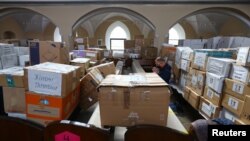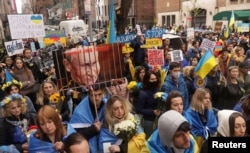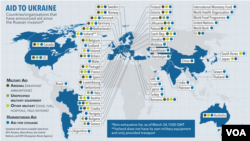International relief agencies say they welcome the global outpouring of aid for Ukraine since Russia's invasion but worry that the crisis is diverting attention and finances from equally urgent humanitarian emergencies in Africa, the Middle East and elsewhere.
The vast scale of the refugee crisis has generated "an extraordinary response" in compassion and aid, an official with the international charity Save the Children said.
"The level of both financial support that has poured into Save the Children, to other international NGOs (nongovernmental organizations) and U.N. agencies … support coming from the U.S. government, the solidarity, the flags waved the Ukrainian colors — I mean, it's just an extraordinary level of support," said Gregory Ramm, who oversees humanitarian response for the charity and is based in Washington.
But "there are many crises that are neglected," he added. "Right now, we have a world facing conflict, facing the climate crisis, COVID, and yet it is difficult to get the world's attention to Sudan, to eastern Congo, to Yemen, to the Sahel, to those places where children are suffering in the same way that the children of Ukraine are suffering."
More than 4.6 million people have fled Ukraine following Russia's February 24 invasion, and another 7.1 million have been internally displaced, the United Nations reports. Of the 11.7 million people who have been displaced inside or outside Ukraine, 7.5 million are children — and they're among 190 million youngsters worldwide living "in areas of serious conflict," Ramm said.
The U.N. estimates 274 million people worldwide will need humanitarian aid this year, up from a record 235 million in 2021. The U.N.'s World Food Program, which had already cut back rations because of funding shortfalls, warned in late March that the crisis involving major grain producers Ukraine and Russia could trigger the worst global food crisis since World War II.
'Dramatic entry' draws support
Maurice Amollo, a Nigeria-based official with the humanitarian aid group Mercy Corps, also praised the "swift" response to the Ukrainian crisis and "the generosity in Europe and the United States and beyond." But, he told VOA in a phone interview, "we are also getting a little concerned that resources and diplomatic support will inevitably be diverted away from millions of other deserving and vulnerable communities around the world into Ukraine."
For instance, Denmark announced that to fund the reception of fleeing Ukrainians, it would defer part of the development aid it had earmarked this year for the West African countries of Burkina Faso and Mali by 50% and 40%, respectively, according to Mercy Corps. VOA was not able to independently verify that information with Denmark's Ministry of Foreign Affairs.
Amollo attributed "big differences" in global response in part to the "dramatic entry" of the Ukrainian crisis as opposed to the "protracted and slow-onset crises" in Afghanistan or Somalia. International media attention, he said, has influenced the distribution of resources, "whether it is individuals or corporations or governments."
Devex, a media platform providing information on global development, said it had recorded more than $4 billion in various countries' commitments to Ukraine, though not all of that amount was for humanitarian aid, nor did it include public giving.
Disparities in aid response were the focus of a March 24 report by The New Humanitarian, an independent news site founded by the U.N.
The report noted that the U.S. announced $1 billion in aid to European countries taking in refugees, on top of earlier contributions, and that other donor states had pledged $1.5 billion toward Ukraine-related humanitarian efforts at a funding conference earlier in March. It quoted U.N. spokesperson Stephane Dujarric as saying, "This is among the fastest and most generous responses a humanitarian flash appeal has ever received."
The situation is quite different in Afghanistan, where an unprecedented 94% of its people say they are suffering, according to Gallup polling. The U.N. reported late last month that it has secured just 13% of the $4.4 billion needed for humanitarian aid in Afghanistan this year.
Who donates and who doesn't
A VOA world map showing various countries' humanitarian and military aid to Ukraine indicates no major contributions from any African nation — or from swaths of Latin America and Southeast Asia.
Economics is one factor behind Africa's absence as a donor, said Terence McNamee, a development and governance specialist in South Africa and a global fellow with the Washington-based Wilson Center's Africa Program.
"The pandemic has been absolutely brutal for African economies. There just isn't the economic means to provide any kind of assistance at the moment," he said.
A second factor involves Africa's complex historical relationships with both Russia and the West. The former Soviet Union supported liberation movements in African countries fighting to shake off the bonds of European colonial powers during the Cold War. More recently, Russia has continued to supply military training, weapons and support and expanded its economic investment in the continent.
"What that amazing map is not revealing is the extent of division within Africa that this conflict has opened up," McNamee said, citing the U.N. General Assembly resolution demanding that Russia immediately halt its military operation in Ukraine. Put to a vote March 2, it passed with support from 141 countries.
While more than half of Africa's 54 countries backed the resolution, 20 abstained or did not vote, "which effectively is at least tacit support of Russia," he said.
He noted that most of the countries that abstained "are either hybrid regimes or authoritarian regimes with quite strong connections dating back to the Cold War and the Soviet era."
African countries were also divided on the April 7 U.N. General Assembly resolution to suspend Russia from the U.N. Human Rights Council. The measure passed by a vote of 93-24, with 58 countries abstaining.
Ebenezer Obadare, a senior fellow for Africa studies at the New York-based Council on Foreign Relations, also noted African governments' reluctance to publicly denounce Russian aggression — and the West's initial irritation "that African countries are not joining the fight" publicly in solidarity with Ukraine.
A native Nigerian who lives just outside Washington, Obadare wrote a March blog post discouraging Western diplomats from taking African leaders for granted and emphasizing the need for finding common ground.
As he later told VOA, "What people are saying in Africa is that it's not OK to invade the territory of another country. We get it." But, Obadare added, they're also saying "that the West ought to live up to its moral rhetoric, that the West has not always done that. … Many of these countries think that they have legitimate grievances, that this is the time for them to also articulate those grievances and to talk about how shoddily they've been treated in the past by Western countries."
African donors help out
Obadare emphasized that "it's important to differentiate between the leadership in African countries and the people of Africa. … Ordinary people are in support of the people of Ukraine."
Some of that support is being channeled through Gift of the Givers Foundation, based in South Africa. It's the continent's largest nongovernmental disaster response and relief agency of African origin, said its founding director, Imtiaz Sooliman, drawing most of its funding from South African individuals, though at least a dozen corporate sponsors have joined amid the COVID-19 pandemic.
"We help people unconditionally. … And we reach out wherever anyone needs help, anywhere in the world," Sooliman told VOA.
Since its Ukraine efforts began — initiated by a Ukrainian woman whose husband is in South Africa — donors have raised more than $100,000 and spurred an aid network reaching at least six Ukrainian cities including Kyiv, Kharkiv, Kherson and Zaporizhzhia, Sooliman told VOA.
In Ukraine, as in the 43 other countries where Gift of the Givers operates, it buys locally procured supplies such as food, diapers, medicine and clothing. In many countries, the organization also provides services such as health care, education and search-and-rescue disaster response.
Gift of the Givers is also soliciting money to help African students in Ukraine and elsewhere to return to the continent.
"This is a unique campaign because it's Africa reaching out to Europe," Sooliman said, noting that Africa often is seen as "a begging bowl, that we are always backward … that we can never do things ourselves."
Sooliman said he wants others "to realize that Africa can do something — that Africa is now helping Europe."











